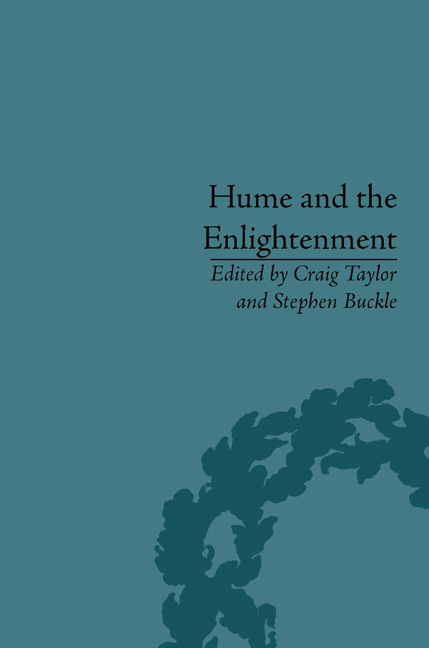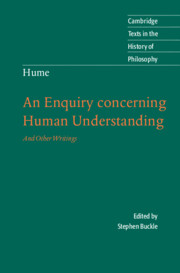71 results
Abbreviations
-
- Book:
- Hume and the Enlightenment
- Published by:
- Pickering & Chatto
- Published online:
- 05 December 2014, pp xiii-xiv
-
- Chapter
- Export citation
Notes
-
- Book:
- Hume and the Enlightenment
- Published by:
- Pickering & Chatto
- Published online:
- 05 December 2014, pp 187-210
-
- Chapter
- Export citation

Hume and the Enlightenment
-
- Published by:
- Pickering & Chatto
- Published online:
- 05 December 2014
-
- Book
- Export citation
Acknowledgements
-
- Book:
- Hume and the Enlightenment
- Published by:
- Pickering & Chatto
- Published online:
- 05 December 2014, pp vii-viii
-
- Chapter
- Export citation
1 - Hume and the Enlightenment
-
-
- Book:
- Hume and the Enlightenment
- Published by:
- Pickering & Chatto
- Published online:
- 05 December 2014, pp 13-38
-
- Chapter
- Export citation
List of Contributors
-
- Book:
- Hume and the Enlightenment
- Published by:
- Pickering & Chatto
- Published online:
- 05 December 2014, pp ix-xii
-
- Chapter
- Export citation
3 - Philosophy, Historiography and the Enlightenment: A Response to Green
-
-
- Book:
- Hume and the Enlightenment
- Published by:
- Pickering & Chatto
- Published online:
- 05 December 2014, pp 53-64
-
- Chapter
- Export citation
Index
-
- Book:
- Hume and the Enlightenment
- Published by:
- Pickering & Chatto
- Published online:
- 05 December 2014, pp 223-227
-
- Chapter
- Export citation
Frontmatter
-
- Book:
- Hume and the Enlightenment
- Published by:
- Pickering & Chatto
- Published online:
- 05 December 2014, pp i-iv
-
- Chapter
- Export citation
CONTENTS
-
- Book:
- Hume and the Enlightenment
- Published by:
- Pickering & Chatto
- Published online:
- 05 December 2014, pp v-vi
-
- Chapter
- Export citation
Introduction: Hume and his Intellectual Legacy
-
-
- Book:
- Hume and the Enlightenment
- Published by:
- Pickering & Chatto
- Published online:
- 05 December 2014, pp 1-12
-
- Chapter
- Export citation
Works Cited
-
- Book:
- Hume and the Enlightenment
- Published by:
- Pickering & Chatto
- Published online:
- 05 December 2014, pp 211-222
-
- Chapter
- Export citation
Hume on the Passions
-
- Journal:
- Philosophy / Volume 87 / Issue 2 / April 2012
- Published online by Cambridge University Press:
- 14 March 2012, pp. 189-213
- Print publication:
- April 2012
-
- Article
- Export citation
Hume's Sceptical Materialism
-
- Journal:
- Philosophy / Volume 82 / Issue 4 / October 2007
- Published online by Cambridge University Press:
- 28 November 2007, pp. 553-578
- Print publication:
- October 2007
-
- Article
-
- You have access
- HTML
- Export citation
Descartes, Plato and the Cave
-
- Journal:
- Philosophy / Volume 82 / Issue 2 / April 2007
- Published online by Cambridge University Press:
- 18 June 2007, pp. 301-337
- Print publication:
- April 2007
-
- Article
- Export citation
Chronology
-
- Book:
- Hume: An Enquiry Concerning Human Understanding
- Published online:
- 05 June 2012
- Print publication:
- 15 February 2007, pp xxxii-xxxiv
-
- Chapter
- Export citation
A Letter from a Gentleman to his Friend in Edinburgh
- from OTHER WRITINGS
-
-
- Book:
- Hume: An Enquiry Concerning Human Understanding
- Published online:
- 05 June 2012
- Print publication:
- 15 February 2007, pp 147-162
-
- Chapter
- Export citation

Hume: An Enquiry Concerning Human Understanding
- And Other Writings
-
- Published online:
- 05 June 2012
- Print publication:
- 15 February 2007
-
- Textbook
- Export citation
Selections from Hume's letters
- from OTHER WRITINGS
-
-
- Book:
- Hume: An Enquiry Concerning Human Understanding
- Published online:
- 05 June 2012
- Print publication:
- 15 February 2007, pp 203-214
-
- Chapter
- Export citation
9 - Of the reason of animals
- from AN ENQUIRY CONCERNING HUMAN UNDERSTANDING
-
-
- Book:
- Hume: An Enquiry Concerning Human Understanding
- Published online:
- 05 June 2012
- Print publication:
- 15 February 2007, pp 92-95
-
- Chapter
- Export citation



